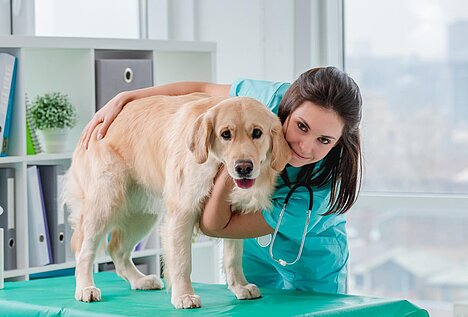Gout

Gout is a painful and unpleasant form of arthritis that occurs when too much uric acid builds up in the blood. You probably know that humans can get gout, but did you know that your dog can get it too? Unfortunately, your poor four-legged friend can suffer from gout, but it won't manifest itself in the same way as in humans. When your dog gets gout, it usually manifests itself in bladder disease due to the high accumulation of uric acid. Gout in the form of arthritis is possible in dogs, but quite rare, so watch out for bladder problems. So how can you tell if your dog has gout? What signs should you look out for? Is there anything you can do to protect your dog from excess uric acid, bladder problems and gout in general?
Signs of gout in your dog
As we've already said, gout in your dog will probably manifest itself differently to what you're used to. In humans, arthritic symptoms typically occur as a result of gout, but in dogs it's more likely to manifest itself in bladder problems. For example, if your dog has great difficulty going to the toilet, is in pain when he or she tries to urinate, or can only produce very small amounts at a time (or no urine at all), you could be dealing with a gout problem. If you already suspect gout, take a look at your dog's urine. Does it look brown? Red? Discolored in any way? Do you think your dog's urine is bloody? Any of these signs could indicate that your dog has gout.
Body language
Here are a few body language signals your dog might be giving you to let you know he or she is suffering from gout-like symptoms:
- Weakness
- Lack of concentration
- Lowered ears
- Tucked tail
Other signs
There are also other signs you should look out for, such as
- Incontinence
- Lethargy or laziness
- Bloody urine
- Inability to produce urine
- Joint problems (rare cases)
Historical causes of gout in dogs
The ultimate cause of gout is a heavy buildup of uric acid that is deposited in body tissues. These needle-shaped crystals usually accumulate in the joints of humans, but in dogs they will mostly be deposited in their urine, causing a lot of bladder problems. So what are the causes of gout in dogs? There are many different factors. A diet that contains far too much protein could be one of the causes. Genetic factors are also always something to consider. Your dog could also not have a healthy or functioning liver or kidney, which is supposed to ensure that the uric acid is removed from his system. Kidney disease is one of the main causes of gout because it impairs the ability to properly get rid of waste products. Historically, Dalmatians have one of the highest rates of gout in dogs because their metabolic system is unique and does not allow excess amounts of protein to pass through the blood.
The science behind gout affecting your dog
Gout is a metabolic and inflammatory disease whose causes, mechanisms and treatments have long been known in humans. Monosodium urate (MSU) crystals, the less soluble crystal form of uric acid, are the trigger for gout. These crystals can form when the temperature and pH of the body fluid is lowered to MSU saturation. Once grown, the crystals promote various inflammatory cascades and arachidonic acid metabolism, resulting in extreme joint pain. Gout was initially thought to be rheumatism, which was then differentiated by Sydenham in 1683.
Training your dog to deal with gout
If your dog is suffering from gout, there are a few things you can do to help them. Firstly, you should always visit a vet to get an accurate diagnosis and find the best treatment for your dog. The vet can also give you advice on how to adjust your dog's diet to lower uric acid levels and prevent bladder stones. Your dog may also need to take medication to inhibit uric acid production or promote uric acid excretion. You should also make sure your dog drinks enough water to dilute his urine and prevent crystals from forming. If your dog has joint problems, you should also give him a soft surface to lie on and not put too much weight on him. With a little patience and care, you can help your dog live better with gout.
The authors assume that a veterinarian should be consulted if an animal is ill and that medication should only be taken after consultation with a doctor or pharmacist. Only an individual examination can lead to a diagnosis and treatment decision.
We help you find the nearest vet → This way